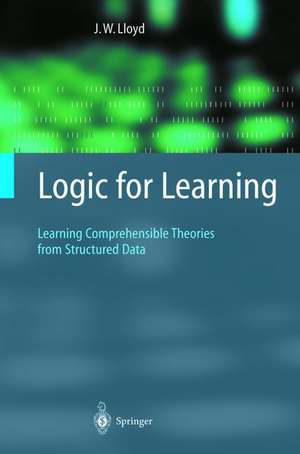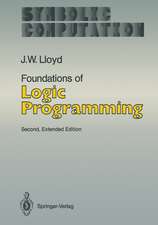Logic for Learning: Learning Comprehensible Theories from Structured Data: Cognitive Technologies
Autor John W. Lloyden Limba Engleză Hardback – 6 aug 2003
| Toate formatele și edițiile | Preț | Express |
|---|---|---|
| Paperback (1) | 331.25 lei 6-8 săpt. | |
| Springer Berlin, Heidelberg – 22 oct 2010 | 331.25 lei 6-8 săpt. | |
| Hardback (1) | 336.21 lei 6-8 săpt. | |
| Springer Berlin, Heidelberg – 6 aug 2003 | 336.21 lei 6-8 săpt. |
Din seria Cognitive Technologies
- 20%
 Preț: 350.99 lei
Preț: 350.99 lei - 15%
 Preț: 649.71 lei
Preț: 649.71 lei - 15%
 Preț: 635.47 lei
Preț: 635.47 lei - 20%
 Preț: 650.73 lei
Preț: 650.73 lei - 20%
 Preț: 644.15 lei
Preț: 644.15 lei - 20%
 Preț: 886.16 lei
Preț: 886.16 lei - 20%
 Preț: 331.91 lei
Preț: 331.91 lei -
 Preț: 390.63 lei
Preț: 390.63 lei - 20%
 Preț: 337.13 lei
Preț: 337.13 lei - 20%
 Preț: 1458.56 lei
Preț: 1458.56 lei - 20%
 Preț: 646.80 lei
Preț: 646.80 lei - 20%
 Preț: 994.08 lei
Preț: 994.08 lei - 20%
 Preț: 649.09 lei
Preț: 649.09 lei -
 Preț: 397.38 lei
Preț: 397.38 lei - 20%
 Preț: 988.00 lei
Preț: 988.00 lei - 20%
 Preț: 1009.61 lei
Preț: 1009.61 lei - 20%
 Preț: 597.18 lei
Preț: 597.18 lei - 20%
 Preț: 614.19 lei
Preț: 614.19 lei - 20%
 Preț: 675.51 lei
Preț: 675.51 lei - 20%
 Preț: 994.40 lei
Preț: 994.40 lei - 20%
 Preț: 891.89 lei
Preț: 891.89 lei - 20%
 Preț: 600.41 lei
Preț: 600.41 lei - 20%
 Preț: 533.76 lei
Preț: 533.76 lei - 20%
 Preț: 647.61 lei
Preț: 647.61 lei - 20%
 Preț: 645.14 lei
Preț: 645.14 lei - 20%
 Preț: 512.39 lei
Preț: 512.39 lei - 20%
 Preț: 338.68 lei
Preț: 338.68 lei - 20%
 Preț: 345.22 lei
Preț: 345.22 lei - 20%
 Preț: 668.55 lei
Preț: 668.55 lei -
 Preț: 365.21 lei
Preț: 365.21 lei - 20%
 Preț: 640.51 lei
Preț: 640.51 lei - 20%
 Preț: 1297.17 lei
Preț: 1297.17 lei
Preț: 336.21 lei
Preț vechi: 420.26 lei
-20% Nou
Puncte Express: 504
Preț estimativ în valută:
64.34€ • 69.87$ • 54.05£
64.34€ • 69.87$ • 54.05£
Carte tipărită la comandă
Livrare economică 22 aprilie-06 mai
Preluare comenzi: 021 569.72.76
Specificații
ISBN-13: 9783540420279
ISBN-10: 3540420274
Pagini: 272
Ilustrații: X, 257 p.
Dimensiuni: 155 x 235 x 20 mm
Greutate: 0.52 kg
Ediția:2003
Editura: Springer Berlin, Heidelberg
Colecția Springer
Seria Cognitive Technologies
Locul publicării:Berlin, Heidelberg, Germany
ISBN-10: 3540420274
Pagini: 272
Ilustrații: X, 257 p.
Dimensiuni: 155 x 235 x 20 mm
Greutate: 0.52 kg
Ediția:2003
Editura: Springer Berlin, Heidelberg
Colecția Springer
Seria Cognitive Technologies
Locul publicării:Berlin, Heidelberg, Germany
Public țintă
GraduateCuprins
Part I: Prologue.- Overview.- Introduction to Learning and Logic.- Part II: Logic.- Higher-order Logic.- Representation of Individuals.- Predicate Construction.- Programming with Equational Theories.- Part III: Learning.- The Problem of Learning.- Knowledge Representation for Learning.- Learning Systems.- Illustrations for Various Types.- Applications.- References.- Notation.- Index.
Recenzii
From the reviews of the third edition:
"John has tried his hand at machine learning, and his aim in Logic for Learning is to demonstrate ‘the rich and fruitful interplay between the fields of computational logic and machine learning’. … As such, the book is more geared towards computational logicians who are interested in machine learning … . The book can also be used as a textbook in a mathematically oriented advanced graduate course. … it is indeed great stuff, which deserves to be taken serious by any computational logician … ." (Peter Flach, TLP – Theory and Practice of Logic Programming, Issue 4, 2004)
From the reviews:
"This book provides a systematic approach to knowledge representation, computation, and learning using higher-order logic. It is aimed at researchers, graduate students, and senior undergraduates working in computational logic and/or machine learning." (PHINEWS, Vol. 3, April, 2003)
"John has tried his hand at machine learning, and his aim in Logic for Learning is to demonstrate ‘the rich and fruitful interplay between the fields of computational logic and machine learning’. … As such, the book is more geared towards computational logicians who are interested in machine learning … . The book can also be used as a textbook in a mathematically oriented advanced graduate course. … it is indeed great stuff, which deserves to be taken serious by any computational logician … ." (Peter Flach, TLP – Theory and Practice of Logic Programming, Issue 4, 2004)
From the reviews:
"This book provides a systematic approach to knowledge representation, computation, and learning using higher-order logic. It is aimed at researchers, graduate students, and senior undergraduates working in computational logic and/or machine learning." (PHINEWS, Vol. 3, April, 2003)
Caracteristici
The first book on learning and knowledge representation based on higher-order logic. Includes supplementary material: sn.pub/extras












